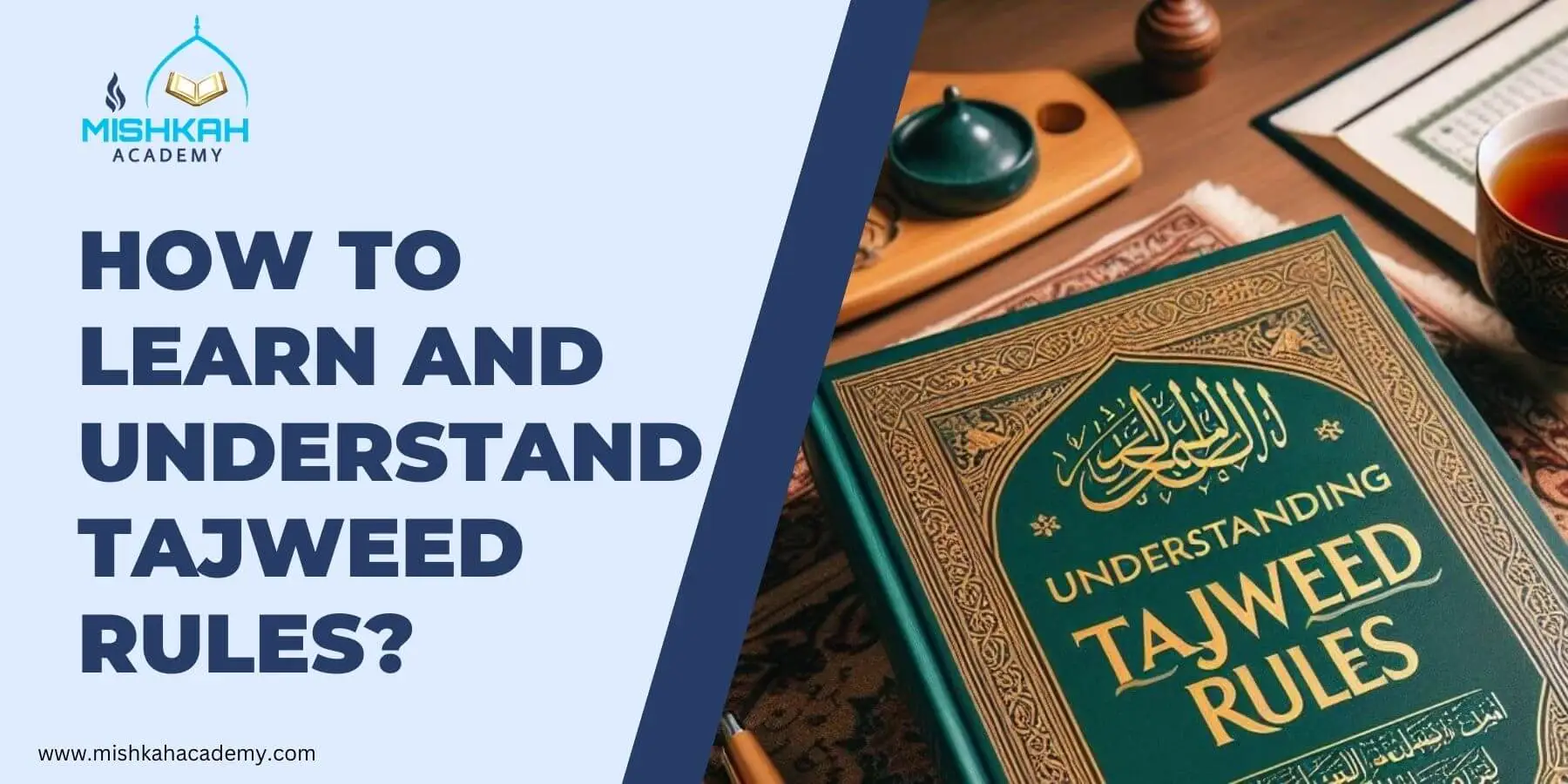Tajweed Rules are the proper recitation of the Quran, following a set of rules and principles to ensure the correct pronunciation and articulation of the Arabic text. Tajweed is derived from the Arabic word “Jawwada,” meaning “to make good” or “to improve.”
Learning the Tajweed rules is among the most vital aspects of reading and reciting the Quran as it should be. One must know that making mistakes while reading the words of Allah (SWT) can alter the meaning, which isn’t ideal. Thus, Tajweed is essential to the correct pronunciation of Quranic words as well as to maintain the right flow.
In the context of Quranic recitation, Tajweed Rules refer to the science of reciting the Quran with the correct pronunciation, articulation, and intonation. It involves applying a set of rules and guidelines that govern the recitation of the Quranic text, ensuring that each letter is pronounced with its proper characteristics, such as length, stress, and oral emphasis.
8 Tips to Learn Basic Tajweed Rules
Table of Contents
ToggleThese tips will break down what exactly Tajweed is in the Quran, how you can learn its rules, how long it would take to learn it all, and more.
1. Learn the Basics of Tajweed from Noorani Qaida
Noorani Qaida is a foundational book used to teach beginners the basic rules of Tajweed. It simplifies the Arabic letters, making it easy for learners to grasp pronunciation.
When starting with Noorani Qaida, you’ll learn how to articulate letters correctly, understand vowel sounds, and practice proper elongation. This method also teaches you to recognize the places of articulation (Makharij) for each letter, helping you build a solid foundation.
2. Learn Tajweed Rules Step by Step
Start your Tajweed journey by focusing on one rule at a time. Begin with the characteristics of each Arabic letter (Sifat) and practice pronouncing them from their correct articulation points (Makharij). Ensure clarity in each sound. Gradually, move on to essential rules like elongation (Madd) and stopping or starting during Quran recitation.
Taking time with each rule will strengthen your understanding and fluency in quran recitation. Allah (SWT) says in Surah Muzzammil, Ayah 4, “and recite the Quran with measured recitation.” This approach ensures accurate recitation, as emphasized in the Quran.
3. Emphasize on Mastering the Makharij
Mastering the Makharij is all about learning how to pronounce Arabic letters correctly by knowing their specific articulation points. Each letter in Arabic comes from a unique spot in the mouth or throat, affecting how it sounds.
For example, the letter “ق” (Qaaf) is pronounced from the back of the tongue touching the soft palate, while “ك” (Kaaf) comes from the middle of the tongue. Understanding these differences is key to reading the Quran properly.
Focus on learning where each letter comes from, practice airflow and tongue placement, and regularly repeat pronunciation exercises. As Allah (SWT) says in Surah Al-Furqan, Ayah 32, the Quran was revealed “in stages,” to be recited with precision.
4. Master the Sifaat-al-Huroof
Learning the Characteristics of Letters (Sifat) entails knowing the distinct characteristics of Arabic letters that influence their pronunciation. These traits include heaviness, lightness, and elongation, which influence the sound and length of speech. It is essential to understand Sifat because mastering these characteristics promotes proper Tajweed to recite Quran beautifully.
Important: Listening to and emulating the pronunciation of competent reciters may also aid to enhance knowledge and application of Sifat.
5. Understand the Rules of Qalqalah
The rules of Qalqalah are essential to proper Quranic recitation. Qalqalah refers to the echoing or bouncing sound produced when certain letters are pronounced with a sukoon (absence of a vowel). It is important to learn these rules to ensure correct pronunciation, especially during pauses in recitation.
- Qalqalah occurs with these five letters: ق, ط, ب, ج, د.
- It happens when the letter has a sukoon (no vowel sound).
- The intensity of the Qalqalah depends on the letter:
- ط (Ta) has the strongest echo.
- ق (Qaf), ب (Baa), ج (Jim), and د (Dal) have progressively softer echoes.
6. Learn All the Different Kinds of Madd
Madd refers to the elongation of sounds in Quranic recitation. Mastering the different types of Madd is essential for reading the Quran correctly, as each type follows specific rules that affect the pronunciation and flow.
Here’s a breakdown of the main types of Madd in Tajweed:
- Madd Asli: Natural elongation, where a vowel is extended for two counts.
- Madd Laazim: Compulsory elongation due to a sukoon followed by a letter with shaddah (doubling).
- Madd Munfasil: Separate elongation, occurring when a letter with sukoon is followed by a vowel.
- Madd Lazim Harfy: Elongation of a specific letter, such as Alif, with no extra vowel sign.
- Alif Madd: Prolongation by adding an Alif after a letter with sukoon.
- Madd Al Badal: Substitution elongation, where a short vowel is replaced with a longer one.
- Madd Wajib Muttasil: Compulsory continuous elongation, where two identical letters meet with a vowel between them.
- Al-Madd: General term used for elongation in Quranic recitation.
- Madd Ewadd: Elongation caused by the repetition of specific letters.
7. Know the Rules of Laam al-Tafkheem and Tarqeeq
Understanding Laam al-Tafkheem and Tarqeeq is key for correct Quranic recitation. Laam al-Tafkheem involves strengthening the letter “ل” (Laam) in specific cases, while Tarqeeq softens the sound of certain letters, making them lighter. These rules ensure accurate pronunciation and enhance the overall beauty of recitation.
Laam al-Tafkheem:
- Occurs when the letter “ل” (Laam) has a Shaddah (doubling), making the sound heavier and more emphasized.
Tarqeeq:
- Softens the letters “ت,” “د,” “ج,” “ز,” “س,” “ص,” “ض,” “ط,” and “ظ” when they carry a Sukoon (no vowel), producing a lighter sound.
8. Take Help from a Qualified Tajweed Tutor
Learning Tajweed from a qualified tutor can make a significant difference in mastering the rules of recitation. Quran classes for beginners offer personalized guidance, correct mistakes, and help you grasp the finer details of Tajweed that may be difficult to learn on your own. A tutor can also demonstrate the proper pronunciation of letters, teach you effective recitation techniques, and ensure you apply the rules correctly.
Benefits of learning from a tutor:
- Personalized lessons tailored to your pace.
- Immediate correction of mistakes.
- Clear demonstration of proper pronunciation.
- Motivation and support for consistent progress.
How Long Does It Take to Learn Tajweed?
The time to learn Tajweed depends on how often you practice and your learning ability. Typically, beginners can understand the basics in 6 to 9 months with 2 hours of practice per week. If you can dedicate more time, around 3 to 4 hours per week, you may master Tajweed in 4 to 6 months.
On the other hand, if you only have 1 hour per week, it might take 12 to 18 months to become proficient. Regular practice at home is essential for steady progress, no matter how long your lessons are.
What is the Best Way to Learn Tajweed?
The most effective way to learn Tajweed is with a qualified tutor who offers personalized guidance, immediate corrections, and feedback tailored to your needs. Online Quran recitation courses provide one-on-one instruction that ensures a deeper understanding of the rules and proper pronunciation. Tutors can adjust lessons based on your progress, making learning faster and more efficient.
Another excellent tool for beginners is Noorani Qaida, which greatly helps in building a strong foundation in Arabic letters and pronunciation. Combining a tutor’s personalized instruction with Noorani Qaida practice creates the most effective path toward mastering Tajweed.
Conclusion
Learning Tajweed is essential for accurate Quranic recitation, ensuring every word is pronounced correctly. When following a structured approach—starting with basics like Noorani Qaida and gradually mastering advanced rules—you’ll build a solid foundation. For beginners, Mishkah Academy is the best source to learn to read Quran online, offering expert tutors with years of experience who provide personalized instruction.






